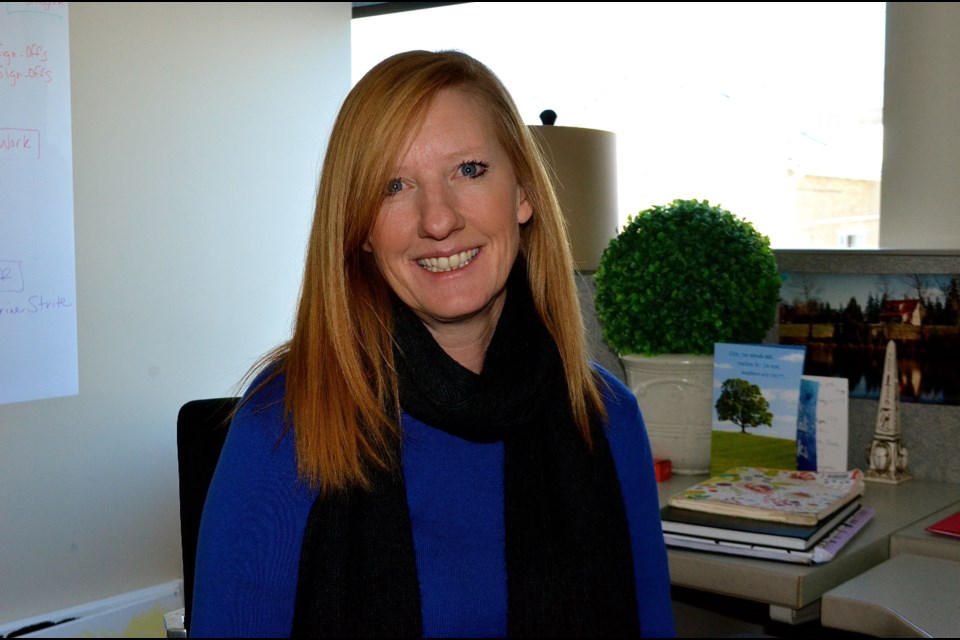As executive director of the Drop In Centre, Gail Hoekstra is in the business of providing services for people in need, but for her, the need goes both ways.
“We all need this place,” said Hoekstra. “When we walk through the door, whether we are a volunteer or whether we are someone who needs something to eat, whether we are needing a place to stay, or whether we are working here, we are all here because we need it. We need this place and the relationships it brings with it.”
She doesn’t see herself as a charity worker.
“I’m not interested in the charity model,” she said. “I like the idea that Sister Christine started and I have kind of grown up with her mentoring me.”
Sister Christine Leyser opened the doors of the Welcome In Drop In Centre in 1983 and for more than three decades dedicated her time and efforts to helping the most vulnerable people in our community. Hoekstra took over as executive director when Leyser retired in 2016 but their relationship began many years earlier.
“She has been a mentor to me since I was 23,” said Hoekstra. “Now I am 50. It has always been, what did you learn? What did you get? We are all getting things in these relationships every day. That’s the important thing.”
Hoekstra grew up in tobacco country near Simcoe, the youngest of five siblings.
“That’s where I spent my whole life from age one on,” she said. “I worked in tobacco all my teenage years. $50 a day.”
She had an early interest in social work but wasn’t sure what she wanted to do.
“My sister worked in mental health and I always loved her stories,” said Hoekstra. “Whenever she came to visit I would tell her to tell me work stories. They were always more interesting than anyone else’s.”
She moved to Guelph in 1988 to study at the University of Guelph.
“I was studying family and social relations at the time,” she said. “I did my undergrad at the U of G and my masters of social work at Wilfred Laurier.”
She worked at an experimental farm for OMAFRA during her undergrad but during the last year, she got a placement at a Canadian Mental Health Clinic.
“I started my placement there and then they hired me,” she said. “That team had a social worker that went to the Drop In Centre on Wyndham Street as an outreach worker and I was really interested in what she was doing. So, one day I asked if I could go and shadow her for a day. That’s when I met Sister Christine and started my relationship. That is really when I said, I love this place.”
She worked as an outreach worker for most of the ‘90s and in 1997 took a job with an agency in Orangeville as a frontline mental health worker. When a condescending lawyer questioned her ability to adequately represent a client she decided to get her masters.
“I worked full time and got my masters part-time,” she said. “For my masters, I did the court program helping people in custody with a mental health issue navigate that system.”
She worked in Orangeville for about 20 years and had three children in the process now aged 17, 12 and nine.
“I was a manager and I was returning to work after having my third child,” she said. “I was sort of struggling and I came to the Drop In and said, ‘Sister, how can we help you do better as an agency with the Drop In Centre people?’”
Hoekstra saw the relationships Leyser was building with people at the centre and it reminded her of why she got into social work in the first place. She had worked her way up as a professional and had job security but missed the frontline work.
“I was driving away and thinking, oh, if I could just work there,” said Hoekstra. “Wouldn’t that be the best job? But I need to be paid. I have a family. I will have to wait until I retire and then that is what I’ll do. I will spend my time there.”
When Leyser broke her leg in 2011 the board started looking for someone who could be groomed to take over when she retired. They offered Hoekstra the job.
“I’ve never made life decisions because of climbing ladders, never,” she said. “I have just let life happen and it has just happened. The responsible thing was to stay at my old job for the pension, the holidays, the stability but my heart was saying this is where I want to go. I came here in 2012 and Sister left in 2016. It was really a great period of time to work with her.”
The Drop In has given Hoekstra the opportunity to build relationships and have a positive influence on people’s lives and she encourages young people interested in social work to join the team.
“If you get them in here and they love it like I did, it changes your life,” she said. “If you want to continue in school in social work, this is the job that is going to give you every experience you have ever dreamt of. Every issue, mental health, addiction, medical health, trauma.”
Building healthy relationships, she said, is essential if we hope to address issues such as chronic homelessness and addiction.
“This is why this is a great job for me because I can have influence but I can also have relationships with the people, which is ultimately what keeps you here,” she said. “It’s the relationships you build. Everything is relationship-driven.”



